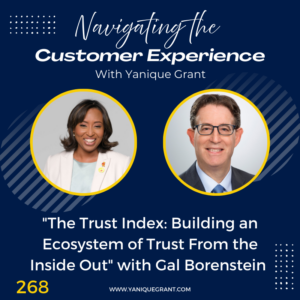Tema Frank is a best-selling author, international speaker, teacher and business consultant. Tema Frank has over three decades’ experience in marketing strategy, usability testing, and customer experience improvement. In 2001 she launched Web Mystery Shoppers Inc., the world’s first company to do “omnichannel” customer experience testing. Using social media techniques before “social media” existed, she recruited a panel of 75,000 mystery shoppers worldwide. In doing all of this, Tema was able to test all of the customer service channels that organizations would experience such as: live chat, telephone, social media and in-store. Tema is also a fellow podcaster and she started podcasting in 2012, she is our podcast senior and her podcast is called Frank Reactions Podcast on Customer Experience, a definitely must listen.
Questions
- Tell us a little about yourself and your journey
- Can you speak a little bit about your 3P profit formula that you speak about in your book and why do you think the brand is so important and what would be some of your recommendations as it relates to a small business trying to incorporate some of the things that your book recommends into their own business?
- What are some everyday solutions that you believe that can help change the mindset of some of these business owners so that training their staff and getting them understand how they want them to treat their customers a priority?
- Tema’s first experience working at a bank where she had team members that were hanging out at a bar with the boss drinking during the working day, while you guys put in all these work, how was that experience?
- What are your thoughts on Social Customer Care?
- What is the one website, tool or app that you absolutely cannot live without in your business?
- We have a lot of listeners who are business owners and managers who feel they have great products and service but they lack the constantly motivated Human Capital. If you were sitting across the table from that person, what’s the one piece of advice that you would give them to have a successful business?
- What’s one thing going on in your life right now that you’re really excited about (What are you working on to develop yourself and your people)?
- What is one quote or saying that during times of adversity and challenges that you refer to as a reminder to help you get more focused?
Highlights
- Tema stated that she was always customer focused and her very first career was in Business Government Relations and as a known as a Lobbyist and that’s all about understanding public and how the public react things and what’s important to them. She stated that she started to develop it from there, that this focus on understanding customers, understanding users, so it was always an interest of hers and then her first book which came out in the mid 1990’s was about Canada’s best employers for women and what she concluded was that best for women were great for men too because they treated all people well and of course a huge element for great customer experience is great employee experience. The recent book just kind of ties it all that together but she thinks that customer experience is just so important because we all are customers and to have a good society, we need to treat each other with respect.
Yanique stated that it’s one of the things that motivated her to start this podcast because she is a customer experience trainer and she goes into organizations and helps them to work with their leaders, work with all of their team members so that they can all get an understanding that customer experience is everyone’s responsibility not just the customer facing employees because for some reason, IT and Accounts seem to think that because they are not directly interfacing with the customers it’s not their responsibility.
- Tema stated that the exciting thing is that in some ways it is easier for small businesses because one of the key elements to creating great customer experiences is a leader, a CEO who cares and who thinks that it’s important, so if you have your own business, you’re in a wonderful place to set that tone. The book Peopleshock: The Path to Profits When Customers Rule, when she talks about the 3 P’s of profit, the 3 P’s are Promise, People and Process and you need to all of these right to create great on going customer experience. The Promise is: why are you doing what you’re doing? And what about it will motivate people to care? And those people include customers and employees and she gives some examples in the book. Even a business as seemingly uninspiring as a janitorial service company, you can find ways to make that inspiring. The Promise is also important because it sets a guideline and a filter for decision making because part of providing great customer service and customer experience involves letting go and giving your front lines more responsibility and more authority, if they’ve all understood and bought into this common vision then they have a filter it helps them make the right decisions when they have to make decisions without you there to say yes or no. People is the second element and we obviously focus a lot on employees which is crucial because you’re not going to have happy customer if you don’t have happy employees but beyond that and beyond the customers and prospects, there is a whole range of other people who will effect whether or not you can deliver consistently great customer experience, so that includes people like your suppliers, your distributors, so if you have been rude to your suppliers and don’t treat them well and there is a shortage of supplies, who think is going to get it? It won’t be you. So all those external relationships with vendors, with all these people can influence ultimately whether or not you can keep on delivering great customer experience through good times and bad. The third P and this is where a lot of organizations slip up is Process, when you are just getting started, you don’t have a lot of processes in place and you can sort of fly by the seat of your pants and just do stuff and get it done and that’s great when you’re getting started. Tema stated that she would really recommend that any small business right from the beginning, start documenting how you’re doing things. There’s a whole bunch of reasons for doing that not just for customer experience, it will also make it easier as you grow but you want to re-evaluate your processes as you grow so every once a year, look back, “how we’re doing things and does this make sense?” there is an example that she gives in the book of a manufacturing company and they complain that there is this one customer for whom they always have to punch a into a piece of metal before they can ship it to them, it was kind of annoying but it was a good customers so they said, “ok, fine, we’ll do it for them” then interviewing the customer, it turned out they were saying, “we love working with this company but it’s really annoying because they ship us these parts with holes in them and we have to fill the hole before we can use it.” Doing some research it turned out that the need for that hole dated back to a decade earlier when they were both using different equipment and at that point it was needed but nobody really had ever reassess the process, here they were doing something that added to the time, added to the cost, added to everybody’s frustration and it wasn’t helping anything, in fact it was hindering. So regularly evaluate that third P.
- Tema stated that the best thing you can if you can persuade them to do it is for them to go and work on the front lines for awhile, just spend a day or half a day or even a month working on the front lines and find out what’s really going on there because as you become more senior in an organization or even in a small business, if you as the CEO are focused on raising money and doing big deals, once you get the deal you’re not thinking about what’s happening to that customer and it’s really easy to lose touch. So the most important thing is get out there, talk to customers, existing customers not just focusing on getting new ones and if it’s possible, get on the front lines and find out what they are experiencing or go undercover. She stated that there is a show in the US called Undercover Boss and it amazes her with that show how many of the CEO’s and they are always shocked by what they discover and she’s thinking, “What makes you think you need to go on TV to do this?” Throw on a wig, go to your store, you don’t need a TV show to do the undercover thing. So that’s something that is really valuable. If you are not the CEO or the owner of the business and you’re trying to convince them then the next best thing that you can do is bring them the voice of the customers, so whether that’s through an audio recording where they are actually hearing the customer complain, something that makes it real to them, even if you can’t get an audio recording, even if it’s transcribing, writing out the words, these are the exact words our customers are using, that will help make it real to them in a way that reports our statistics or you telling them in your own words just aren’t going to have the same impact. She recommends if you can get them on the front lines or getting yourself on the front lines and if you can’t at least present the voice of the customer to those in charge.
- Tema shared that one of her first work experiences was depressing and that was what led her into entrepreneurship because she thought that was just ridiculous. It was an interesting experience, basically they apart of a rebel unit that was set up and the guy that was leading the rebel unit, he was great at building a team which did involve hanging out in bars and partying but then once he had the team in place and there was work to be done, he wanted to continue hanging out in bars and partying and her boss came to her said, “Look, you’re not helping your career by staying in the office and doing your job, you should be at the bar with the VP” she was working in marketing at the time. She said, “Sorry, that was not what I signed up for” when the time came for lay offs, all the first people to get let go were those of them that was doing the work and it took 9 months before head office realise that everything was falling apart and then he finally got fired but it was really frustrating and disheartening experience but it gave her the opportunity to start her own business.
Yanique stated that she believes that out of every negative situation there is always something positive that can come from it. So Tema sharing her story and seeing how she has been able to rise above the obstacles and she is able to let people know that at the end of the day you do have some employees who genuinely want to come and do a great job, they are not into slacking off and just sitting around and not doing anything, so that’s important.
Tema shared that the thing is, if employees are just slacking off and not doing anything is usually because you have failed to motivate them with that promise. You’re not treating them right; you’re not inspiring them. Tema stated that money is necessary so that you can survive but paying somebody more won’t get them to be more customer friendly. She stated that one of the biggest solutions that entrepreneurs could use to motivate their employees is involving them into decisions making, instead of imposing decisions from above, try to get decisions to often flow from below, so the people who are closet to your customers in some ways have the best knowledge about what’s going on in your organization and a lot of employee unhappiness is because they feel they are not heard and they do in fact know better than some of their bosses but the bosses won’t listen and don’t care about what they think. So you want to involve people at all levels and from all departments in decision-making and in strategizing about how we can make things better for the customer. Earlier Yanique mentioned that often IT and Accounts don’t think that customers have anything to do with them and one thing to over come that is to get those people on departmental teams and let them start hearing the customer. Her first major business with Web Mystery Shoppers, the reason she created that company which was in the early days of eCommerce and websites and she found that their was a marketing department, sometimes a completely separate eCommerce unit and then the IT people, they all depended on each other but they were set up as completely separate units and weren’t even speaking the same language and what she did with that business is that she would have anywhere from 30 to 300 people from their target market who gave detailed feedback about, “This is what’s frustrating us about your website” and when she was able to go back to all these units and show them that it was a way to bring all these people together and realise that they did have a common objective.
Yanique stated that on Tema’s website is that there is a free book that you offer 85 Tips for User Friendly Website and one of the things she found is that when she is looking for guests for her show and she’ll probably source them through Amazon if they wrote a book that really inspired her and thinks it would be good to hear their message and Amazon probably has their profile with information about the author and it usually should have a link to their website or some of the authors has their email address listed right there, what she found very frustrating as a customer herself is that most websites for some reason have a contact us form where they control how they contact you versus giving her the opportunity for you to provide their email address so that she can reach out to them because when she sends that contact us form and it says send, she is not guaranteed that somebody is going to receive that in an inbox and respond to her in a reasonable time. Tema shared that is part of what is driving people onto Social media to complain as if you provided me with better service in quieter means whether it’s making yourself easily accessible to customers through phone or through email and dealt with that better then people would not go and complain about you so much in public.
- Social Customer Care is something that is rising – many companies have contributed to that happening by underfunding their Call Centers. Therefore, as a customer if you have a choice in sending out a tweet and getting a response versus spending half an hour hold – of course the customer will choose the quickest response and do the tweet! So what has happened is companies have trained customers to go on Social Media, so we can’t turn that clock back and so smart companies are now staffing accordingly and making sure they catch things on Social Media quickly and deal with them well and quickly.
- Yanique shared that many customers do not share private messages with companies – they post the complaint on their wall. Tema agreed and said as a company – you should respond immediately in a non – defensive way. Tema also made reference to the CEO of United Airlines that companies should start by blaming the customer! Companies should approach the complaint calmly, let’s talk about this sounds complicated, maybe we can discuss this offline – I would be happy to help you. Then you send the message to anyone that saw the public tweet that, “Yes, we care and we want to help.” Tema responded to Yanique’s question by saying deleting posts or complaints that customers make is a very silly approach as this places you at risk for the situation to escalate further. Especially in an era with Screenshots!
- Tema shared the one website, tool or app that she absolutely cannot live without in her business is Gmail. An enhancement to Gmail called “Active Inbox.” Tema shared Active Inbox is a task manager that is attached to Gmail that allows you to set tasks, set appointments.
- Tema shared some of the books that have some great impact on her over the years – “The Effective Executive” by Peter Drucker – so much good advice about how to bring out the best in your people. The one message that has stuck with Tema over the years is instead of trying to fix people’s weaknesses – structure their jobs so they focus on their strengths. Her other book recommendation was “The Elements of Style” by William Strunk Jnr. and E.B. White, about how to write more clearly and effectively – the main message Tema has taken away is to omit needless words – anytime you have written anything go back and see if you can substitute a 3 syllable word with a one syllable word and have the same meaning – the more you can distill that way – the more powerful your message will be.
- In response to Yanique’s question on how to motivate your employees in having a successful business – hire carefully and listen to all of your employees, ask them questions, get to know them, involve them in ideas and decision making. If you do that and involve them as a real person – you will get plenty out of them.
- Tema shared that she is working on an update for her first book that she wrote in the mid 90’s – Best Employer. Tema is also working on how she can make the concepts and principles of Peopleshock: The Path to Profits when Customers Rule more accessible through online courses and workbooks.
- Tema shared that connecting with her is pretty easy:
- Email: tema@frankreactions.com
- Twitter @temafrank
- Linked In – Tema Frank
- Frank Reactions Facebook Page
- Frank Reactions Podcast on Customer Experience
- Tema shared the quote or saying that she uses to re-ignite her spirit during times of adversity is “Remember the movie isn’t over yet” – meaning we are at a low point but something good is coming!




